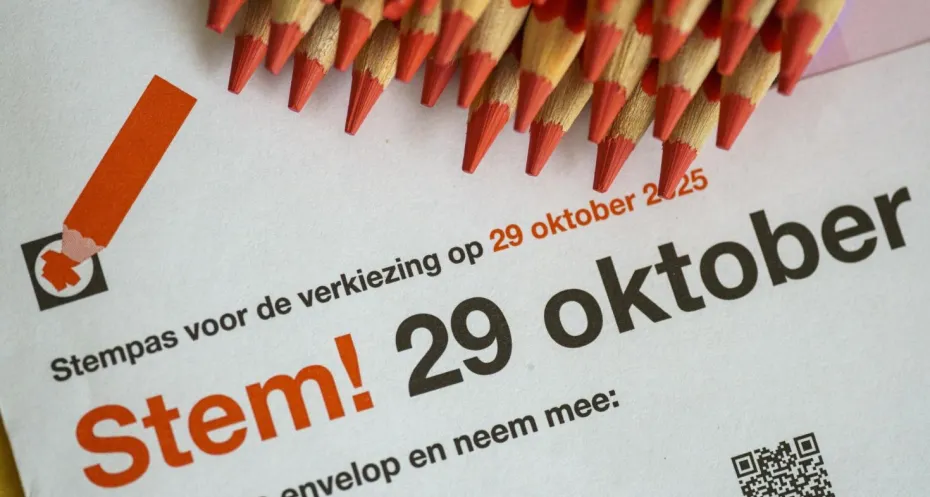Political Press Freedom Meter: Press freedom is not a given in the Netherlands

Free Press Unlimited publishes the Political Press Freedom Meter 2025. The results show that Volt, D66, and the Partij voor de Dieren (PvdD) are the strongest advocates for press freedom. At the same time, the findings reveal that press freedom in the Netherlands is less self-evident than we like to think. Not all political parties - including some currently leading in the polls - recognise or defend the importance of a free media. According to Free Press Unlimited, this is a worrying development.
In the run-up to the Dutch general elections on 29 October 2025, Free Press Unlimited examined what political parties say and do for press freedom. The Political Press Freedom Meter evaluates both party programmes and motion voting records in the House of Representatives. The Political Press Freedom Meter evaluates both party programmes and voting records in Parliament. The results are clear: some parties actively protect press freedom, while others pursue policies that restrict it - a cause for concern according to Free Press Unlimited.
When democracy is under pressure, press freedom is the first to suffer
Press freedom is often the first casualty when democracies come under strain. A free press ensures that those in power can be held accountable for their actions. Restricting press freedom gives those in power free rein to spread doubt and disinformation. Parties that attack independent media or journalists undermine one of the fundamental pillars of democracy. That is why a vote for press freedom is so crucial.
Major differences between political parties
The Political Press Freedom Meter 2025 reveals clear differences between parties:
- Volt ranks highest, linking clear principles to concrete proposals. D66 follows closely behind.
- Volt, D66, and the Partij voor de Dieren (PvdD) are the only parties with specific proposals to improve journalists’ safety, including measures addressing the growing legal pressure on the media.
- When looking at motion voting behaviour alone, GroenLinks-PvdA performs best, followed by D66 and Volt.
- The VVD shows an interesting contrast: its election programme performs adequately, but this is not reflected in its motion voting behaviour, where the party scores slightly below average.
- The PVV performs worst in both analyses.
Free Press Unlimited is concerned about these results. The PVV scores lowest on press freedom, while polls currently indicate it is the largest party in the Netherlands.
The state of press freedom: cause for concern, but also for action
The Political Press Freedom Meter makes it clear that press freedom in the Netherlands is vulnerable. It is worrying that several political parties are proposing measures that actively threaten press freedom, despite knowing that a free and safe press is the cornerstone of democracy.
When journalists are intimidated, attacked, or restricted in their work, it affects not just the media, but society as a whole. We are witnessing a global trend in which politicians and other powerful actors increasingly portray journalists as “enemies of the people”. In the Netherlands, political rhetoric towards journalists has also hardened, and the independence and integrity of the media are being questioned more frequently.
A well-known example is Geert Wilders’ 2021 remark calling journalists “tuig van de richel” (translating to “scum of the earth”), which he refused to retract during the coalition formation last year. But other parties, such as the BBB, have also submitted parliamentary questions that challenge the independence and integrity of the public broadcaster NOS. This rhetoric undermines trust in journalism and normalises a climate of hostility and violence against journalists.
The number of attacks on journalists has been rising in recent years. In 2024, 249 safety incidents were reported to PersVeilig, the highest number to date. Yet this issue is rarely addressed in party programmes - only a few parties propose concrete measures to improve journalists’ safety.
At the same time, new legislation currently under discussion in Parliament poses potential risks to press freedom. For example, the proposed “glorification of terrorism” law could open the door to the political prosecution of journalists. Legal intimidation, such as SLAPPs (Strategic Lawsuits Against Public Participation), also represents a growing threat to independent media.
Opportunities to strengthen press freedom
There are, however, also opportunities to strengthen press freedom in the Netherlands. The implementation of the European anti-SLAPP Directive would help protect journalists from legal harassment. Building on existing initiatives such as PersVeilig can further improve the physical and digital safety of journalists. Financial measures, such as maintaining a low or zero VAT rate on journalistic products, can also help keep independent media financially sustainable and accessible to a broad public.
The Press Freedom Meter as a tool for informed voting
Free Press Unlimited hopes the Political Press Freedom Meter will help voters take press freedom into account when casting their vote.
“We don’t tell people who to vote for,” says Benthe Priester, Policy & Advocacy Officer at Free Press Unlimited. “But we do believe it’s vital that everyone understands where parties stand on something as fundamental as press freedom.”
How the Political Press Freedom Meter works
The Meter assesses political parties across four dimensions of press freedom:
- Online information society & disinformation
- Media pluralism
- Safety of journalists
- International commitment to press freedom
The assessment combines party programmes with voting records in Parliament. All parties were given the opportunity to provide feedback.
Want to see how all parties perform in each dimension? Download the full report below (only in Dutch)
Learn more
Press freedom begins with public support. By standing up for journalists and voting with awareness, you actively help to protect it. Curious how political parties score on other key democratic values, including press freedom? Check out the Democracy Compass (Democratiewijzer), developed with support of Free Press Unlimited.
